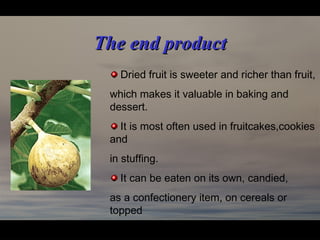Figs
- 2. Facts and info on Dried FruitsFacts and info on Dried Fruits If a ripe fruit is dried it loses most of its moisture, accumulates natural sugar and keeps almost indefinitely This fact has been know to the middle eastern people for over 5000 years, they have always preserved dates, figs and apricots by sun drying, which is still the most favored technique Medieval Europeans put their apples into warm ovens, then peeled, and threaded them onto strings and suspended them from kitchen ceiling. In the monasteries, however, monks dried their plumes grapes and apples on stone, straw covered floors.
- 3. How it is processedHow it is processed 6 pounds of fresh fruit will produce only 1 pound of dried fruit. The fruits are harvested by hand; the stalks and pits are removed. They are then fumigated and graded before spread out in the sun to dry. While sun drying gives fruit a golden, translucent appearance which cannot be achieved mechanically, it has many disadvantages, firstly that of cost, which makes mechanical dryers more popular.
- 4. The end productThe end product Dried fruit is sweeter and richer than fruit, which makes it valuable in baking and dessert. It is most often used in fruitcakes,cookies and in stuffing. It can be eaten on its own, candied, as a confectionery item, on cereals or topped with cream, yogurt or custard.
- 5. Fig ( ficus carica )Fig ( ficus carica ) Fig (English), Higo (Spanish), Figue (French), Feige (German), Fico (Italian). Distant Affinity: Mulberry; Breadfruit; Jackfruit; Chinese Mulberry Origin: The fig is believed to be indigenous to western Asia and to have been distributed by man throughout the Mediterranean area. Remnants of figs have been found in excavations of sites traced to at least 5,000 B.C.
- 6. The secret behindThe secret behind Although considered a fruit, the fig is actually a flower that is inverted into it. The seeds are drupes, or the real fruit. Figs are the only fruit to fully ripen and semi-dry on the tree. For many years the fig has been used as a coffee substitute. The fruit contains a proteolytic enzyme that is considered an aid to digestion and is used by the pharmaceutical industry. And, because of its high alkalinity it has been mentioned as being beneficial to persons wishing to quit smoking.
- 9. Growth Habit: Grows upto 50 ft tall, but more typically to a height of 10 - 30 ft. Their branches are muscular and twisting, spreading wider than they are tall. Fig wood is weak and decays rapidly. The trunk often bears large nodal tumors, where branches have been shed or removed. Frost damage.
- 10. The twigs are pithy rather than woody. The sap contains copious milky latex that is irritatin to human skin. Fig trees often grow as a multiple-branched shrub, especially where subjected to frequent









